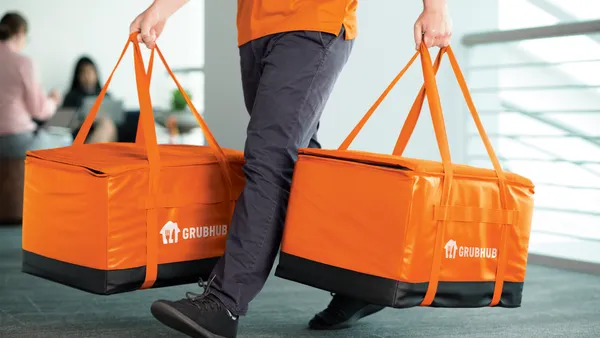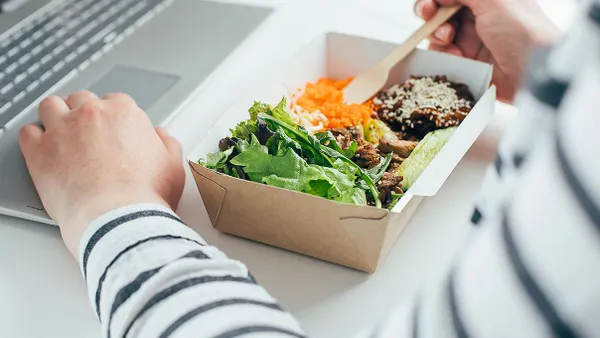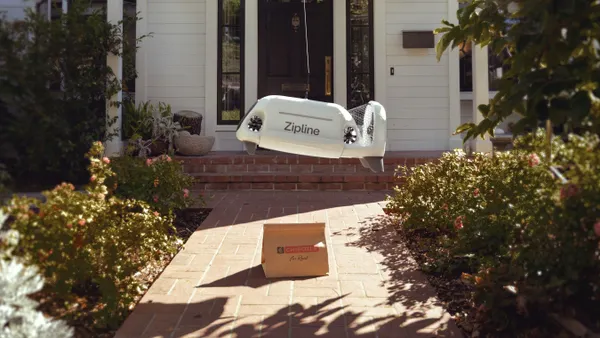UPDATE: Dec. 1, 2020: Uber completed its acquisition of Postmates Monday and the companies have begun integrating U.S. operations. Uber estimates that Postmates will contribute between $350 million and $400 million to Uber's delivery gross bookings and increase delivery adjusted EBITDA by between $7 million and $12 million, according to an SEC filing.
Dive Brief:
- Uber acquired Postmates for $2.65 billion Monday, making this the largest deal between two American-based food delivery companies in 2020, according to a press release. The deal is expected to close in Q1 2021. Uber will run the consumer-facing Postmates app separate from its Uber Eats app.
- The all-stock acquisition, which comes on the heels of Uber's failed deal with Grubhub, will give Uber Eats the largest market share in Los Angeles and builds on its lead in Miami, which are Postmates' two largest cities. Uber estimates that it will issue approximately 84 million shares of common stock for 100% of the fully diluted equity of Postmates.
- "As more people and more restaurants have come to use our services, Q2 bookings on Uber Eats are up more than 100 percent year on year. We’re thrilled to welcome Postmates to the Uber family as we innovate together to deliver better experiences for consumers, delivery people, and merchants across the country,” Uber CEO Dara Khosrowshahi said in the release.
Dive Insight:
This deal comes just weeks after Uber's failed attempt to merge with Grubhub, and gives Uber Eats 35% of U.S food delivery market share, according to April data from Edison Trends. This puts the company second only to DoorDash in the American delivery race, which holds 45% of market share.
Postmates could help Uber's Eats business carry the company through the economic uncertainty of the novel coronavirus crisis. The platform's Rides segment saw gross bookings slip 80% in April compared to the year-ago period, but Eats' gross bookings rose more than 50% during the period. Though Postmates is only the fourth-largest American food delivery company by market share, its strongholds in Los Angeles and Miami give Uber a new edge on the West Coast and a more robust presence in the Southeast. But DoorDash — the last major standalone player in the U.S. market — is quickly gaining ground in the Los Angeles market, so the balance of power there will need to be defended.
Uber anticipates more than $200 million in run-rate synergies one year after the deal closes. Postmates has experienced 67% growth in gross bookings year-over-year, has over 115,000 partner restaurants and more than 10 million active customers, which includes a loyal millennial fan base, according to Uber. Comparatively, Uber has experienced 100% growth in gross bookings year-over-year, has 400,000 partner restaurants and 111 million monthly active customers.
Uber's Postmates grab could also accelerate consolidation in the U.S. delivery market, which has turned to mergers and acquisitions in a bid to reach profitability. Aside from DoorDash, however, the remaining players would be small add-ons, like Waitr and other local operators. Grubhub, for example, had already folded Seamless and Eat24 into its portfolio long before merging with European delivery giant Just Eat Takeaway in a $7.3 billion deal in early June. DoorDash owns Caviar and Uber Eats bought Ando — a food delivery app developed by chef David Chang — in 2018, but Postmates has not added any rival operators to its portfolio.
Postmates could also be looking to go public through an IPO later this summer, The Wall Street Journal reports. The delivery platform filed an IPO confidentially in February 2019, but delayed after investors soured on unprofitable Silicon Valley startups like WeWork. This could help Postmates ramp up its growth rate and improve its technology, in addition to the new tech expertise it will gain access to under Uber's umbrella. Postmates had previously explored deals with DoorDash and Grubhub, The New York Times reports.
Even with a competitor out of the field and in its own network, Uber Eats still faces an uphill battle when it comes to profitability.
“The competition is so fierce that none of [the delivery platforms] are making money. And until last year when Uber went public, they're all being funded by private equity dollars that were being thrown at each other. There needs to be some rationalization that comes with consolidation,” former Uber Chief Business Officer Emil Michael told Restaurant Dive in a recent interview.













